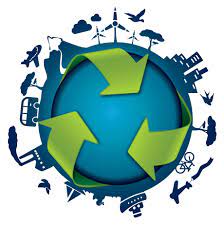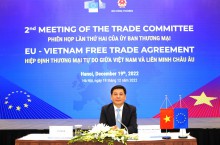The News
Pagán: WTO can facilitate circular economy through transparency, standards
Addressing climate change is a key priority for the Biden administration, including via trade policy. During the WTO’s “Trade and Environment Week” this week, the U.S. homed in on one area: creating a circular economy in which goods and materials are reused and recycled to stay in circulation for longer. In this, Ambassador María Pagán said, the WTO can do its part. The World Trade Organization has an important role to play in facilitating the transition to a more circular global economy, the U.S. ambassador to the organization said this week, citing enhanced transparency and promotion of international standards as two key aspects to this role.
Addressing climate change is a key priority for the Biden administration, including via trade policy. During the WTO’s “Trade and Environment Week” this week, the U.S. homed in on one area: creating a circular economy in which goods and materials are reused and recycled to stay in circulation for longer. In this, Ambassador María Pagán said, the WTO can do its part. The World Trade Organization has an important role to play in facilitating the transition to a more circular global economy, the U.S. ambassador to the organization said this week, citing enhanced transparency and promotion of international standards as two key aspects to this role.
The World Trade Organization has an important role to play in facilitating the transition to a more circular global economy, the U.S. ambassador to the organization said this week, citing enhanced transparency and promotion of international standards as two key aspects to this role.

Addressing climate change is a key priority for the Biden administration, including via trade policy. During the WTO’s “Trade and Environment Week” this week, the U.S. homed in on one area: creating a circular economy in which goods and materials are reused and recycled to stay in circulation for longer. In this, Ambassador María Pagán said, the WTO can do its part.
“What we can do here is, first, have these types of conversations so that we can understand what the issues are and what needs to be done,” she said during an event on Wednesday hosted by Silverado Policy Accelerator, a think tank headed by Maureen Hinman, former director for environment and natural resources at the Office of the United States Trade Representative. The U.S. on Tuesday sponsored its own panel on the circular economy, which featured assistant USTR for environment and natural resources, Kelly Milton, as moderator.
But beyond these discussions, Pagán added, there are “two very key things” the WTO can do: Improve transparency on measures related to the circular economy and promote a more common approach by standards setting.
With transparency, Pagán noted that many governments are attempting to work on the issue and foster more circularity. Through WTO notifications and other transparency efforts, members can be providing important information to each other about “what these issues are [and] are they consistent,” among other questions, according to Pagán.
“The other key thing that also is part of the work we do here is promoting use of international standards,” she said, adding that different regulatory approaches prevent stability for businesses. This doesn’t necessarily mean members must become fully harmonized in their approaches, but they should aim to ensure trade in this area is “easier for companies … particularly for smaller companies that may not have the resources,” she said.
Having these conversations with governments as well as businesses and other interested stakeholders, Pagán said, can ensure “whatever standards we’re using are as harmonized as possible, and that, obviously is by using international standards.”
This point was echoed by Crispin Conroy, with the International Chamber of Commerce, who said a lack of consistency in regulatory frameworks is one of the main barriers to more circularity efforts, according to the organization’s members.
“I think that’s a real opportunity for the WTO,” he said, citing the Trade and Environmental Sustainability Structure Discussions, a plurilateral initiative at the WTO, as a prime forum for such talks. TESSD features most major members of the WTO – including the U.S., the European Union and China – and has a working group dedicated to facilitating the circular economy.
“Recommendations about the sorts of frameworks could be a high impact [outcome] and done quite quickly as well,” Conroy added.
Even incremental progress, moving forward where easy agreement can be reached among members, would be helpful, said Amy Burke, head of global policy and strategy at HP. The business community would love to see some progress “as quickly as possible,” she added.
The U.S. supports a “trade-facilitative” approach to trade in remanufactured and reused goods as a part of promoting a circular economy, according to Pagán, who argued a trade-restrictive approach would result in “environmentally and economically inferior outcomes, such as sending these valuable, lower carbon manufacturing inputs to landfills rather than keeping them in productive use.”
This is not an entirely new issue for the U.S., she noted, pointing to the inclusion in many of the country’s trade agreements of an article on remanufactured goods. In the past, those provisions have proven “very contentiously negotiated” and had to focus on very specific products, she said, adding that she hoped that would be less the case moving forward.
“For a long time in our trade agreement practice we have had an article on remanufactured goods, remanufactured products – facilitating trade in remanufactured products – and it was always really hard, even though it was fairly contained. It was really hard to negotiate because nobody wanted to deal with it, like ‘No, you just want to send us your crap. You're just sending us your throwaway stuff,’” she said. “I think there were many reasons for it. And I am hopeful that we were just confronted with people just thinking about things very differently. And now we’re all worried about the circular economy.... I hope that we have all evolved to see that these things are – that facilitating this kind of trade, you know, with the kind of safeguards that are necessary, is really useful.”
Hannah Monicken (hmonicken@iwpnews.com)



